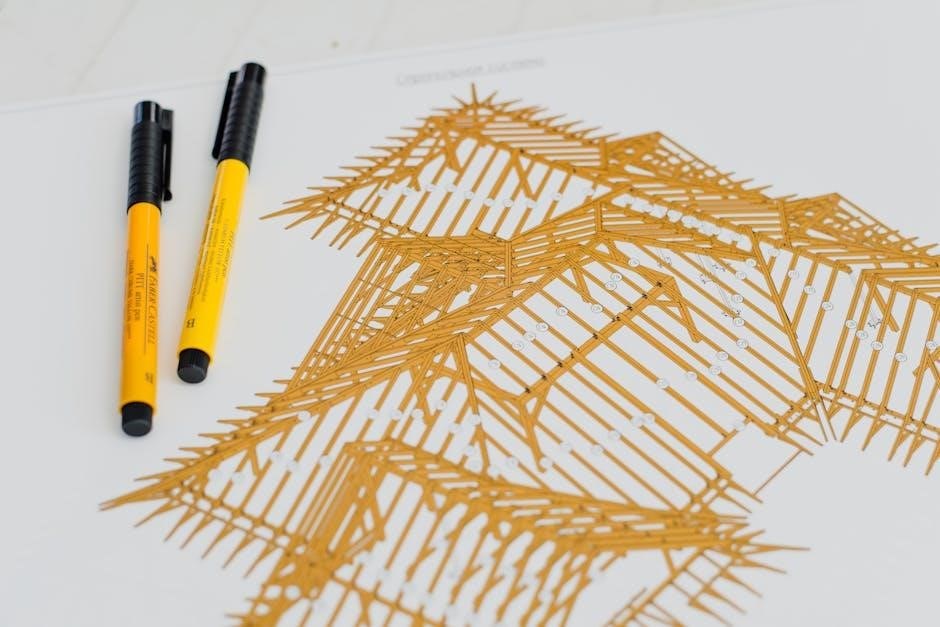The Advanced Diploma of Civil Construction Design is a comprehensive qualification designed to equip professionals with advanced skills in civil construction design processes. It focuses on developing expertise in managing complex projects, ensuring compliance with industry standards, and applying technical knowledge to real-world challenges. This qualification is essential for those seeking to enhance their career opportunities in civil construction and is often required for migration and visa applications in Australia. The accompanying skill assessment requirement PDF guide provides detailed instructions and resources to help candidates prepare effectively for their assessments.
1;1 Overview of the Qualification
The Advanced Diploma of Civil Construction Design (RII60520) is a nationally recognized qualification under the Australian Qualifications Framework (AQF). It is designed to develop advanced skills in civil construction design, focusing on managing design processes, preparing detailed plans, and ensuring compliance with industry standards. The qualification consists of 12 units, including 5 core units and 7 electives, allowing specialization in areas like civil or plumbing engineering. It is ideal for professionals seeking to enhance their technical expertise and career opportunities in the civil construction sector. The accompanying skill assessment requirement PDF guide provides detailed insights into the qualification’s structure, outcomes, and assessment processes, ensuring candidates are well-prepared for their professional journey.
1.2 Importance of Skill Assessment in Civil Construction
Skill assessment is crucial in civil construction to ensure professionals meet industry standards and possess the necessary competencies. It validates both academic qualifications and practical experience, essential for roles requiring precision and safety. In Australia, skill assessments are often required for migration and visa applications, particularly for occupations like Civil Engineering Draftspersons (ANZSCO 312211). They verify an individual’s ability to apply technical knowledge and design skills effectively. By ensuring professionals are adequately trained, skill assessments contribute to project success and industry growth, while also providing a pathway for career advancement and recognition in the civil construction sector.

Core Units of the Advanced Diploma
The Advanced Diploma requires completing five core units, including RIICWD601E, which focuses on managing civil works design processes. Units are selected based on industry relevance and qualification level.
2.1 RIICWD601E — Manage Civil Works Design Processes
RIICWD601E focuses on managing civil works design processes, emphasizing planning, risk assessment, and integrating advanced design strategies. This unit requires demonstrating the ability to oversee complex projects, ensuring compliance with industry standards and best practices. Learners must apply technical knowledge to manage resources, coordinate teams, and deliver designs aligned with project objectives. Evidence of competency includes developing detailed project plans and implementing quality control measures. The unit is critical for professionals aiming to lead civil construction projects effectively, ensuring safety, efficiency, and sustainability. Assessment involves practical tasks and documentation, aligning with the requirements outlined in the Civil Construction Design skill assessment PDF guide.
2.2 Other Core Units and Their Relevance
Beyond RIICWD601E, the Advanced Diploma includes core units that complement its focus on civil construction design. These units cover essential skills such as planning, risk management, and resource coordination. They ensure learners develop a holistic understanding of civil works, from conceptualization to execution. Each unit is designed to address specific industry needs, such as integrating sustainability practices and adhering to safety standards. By mastering these core units, professionals gain the expertise required to handle diverse civil construction projects effectively. Their relevance lies in providing a strong foundation for advanced roles, aligning with the competency requirements outlined in the Civil Construction Design skill assessment PDF guide.

Elective Units for Specialization
Elective units allow learners to specialize in Civil Engineering Draftsperson or Plumbing Engineering Draftsperson skills, enabling tailored skill development aligned with industry demands and career goals.
3.1 Civil Engineering Draftsperson Skills
Civil Engineering Draftsperson Skills focus on preparing detailed drawings and plans for civil engineering projects. This specialization equips learners with the ability to support civil engineers and technologists by creating precise technical documents. Key skills include drafting structural designs, interpreting engineering data, and applying software tools like CAD. The skill assessment for this specialization requires demonstrating proficiency in translating design concepts into actionable plans, ensuring adherence to industry standards. Successful completion of these units is crucial for roles in infrastructure development, transportation projects, and urban planning, making it a vital component of the Advanced Diploma program.
3.2 Plumbing Engineering Draftsperson Skills
Plumbing Engineering Draftsperson Skills involve creating detailed drawings and plans for plumbing systems, including water supply, drainage, and gas installations. This specialization trains learners to design efficient and compliant plumbing layouts under the guidance of engineers and technologists. Key competencies include proficiency in CAD software, understanding of plumbing codes, and the ability to integrate systems into broader construction projects. The skill assessment requires demonstrating technical accuracy, problem-solving, and adherence to safety standards. These skills are essential for roles in residential, commercial, and industrial plumbing projects, ensuring systems meet regulatory and functional requirements.

Skill Assessment Requirements
Skill assessments for the Advanced Diploma require applicants to demonstrate academic qualifications and work experience. An AQF Diploma or higher and relevant work experience are essential.
4.1 Academic Qualifications Needed
To meet the skill assessment requirements for the Advanced Diploma of Civil Construction Design, applicants must hold an Australian Qualifications Framework (AQF) Advanced Diploma or higher. The qualification must be relevant to civil construction design, demonstrating expertise in managing design processes, technical skills, and knowledge of construction practices. Academic transcripts and certificates from recognized institutions must be provided as evidence. The curriculum should align with industry standards, including subjects like design software proficiency and construction project management. Evidence of completing core units such as RIICWD601E is essential. The academic qualifications must be authenticated and verified by the assessing authority to ensure compliance with migration and professional standards.
4.2 Work Experience Requirements
Applicants for the Advanced Diploma of Civil Construction Design must demonstrate relevant work experience in addition to academic qualifications. Typically, at least one year of post-qualification experience in a related field is required. This experience should involve practical application of skills in civil construction design, such as managing design processes, preparing technical drawings, or working with design software. The experience must align with the units of competency outlined in the qualification, such as RIICWD601E. Evidence of employment, project involvement, and specific tasks must be provided to validate the experience. This ensures the applicant’s ability to apply theoretical knowledge in real-world scenarios effectively.
4.3 Assessment Process and Documentation
The assessment process for the Advanced Diploma of Civil Construction Design involves both theoretical and practical evaluations. Applicants must submit detailed documentation, including evidence of academic qualifications, work experience, and project portfolios. Documentation must align with the units of competency, such as RIICWD601E, and demonstrate practical application of skills. Assessments may include knowledge tests, case studies, and reviews of design projects. A positive assessment outcome is essential for migration purposes and must be validated by authorized bodies like VETASSESS. Proper documentation ensures the applicant’s ability to meet industry standards and effectively contribute to civil construction projects. Accuracy and relevance of submitted materials are critical for a successful assessment.

Key Skills and Knowledge for Assessment
Key skills include technical drafting, proficiency in design software, understanding of construction processes, and knowledge of industry standards. These competencies are crucial for a successful assessment.
5.1 Technical Skills in Civil Design
Technical skills in civil design are essential for creating detailed drawings and plans for infrastructure projects. Proficiency in CAD software, understanding of design principles, and knowledge of materials and structural integrity are critical. These skills ensure accuracy and compliance with industry standards. Assessments evaluate the ability to apply engineering concepts to real-world challenges. Candidates must demonstrate expertise in preparing sketches, charts, and tabulations for civil works. Practical experience in managing design processes and integrating best practices is also assessed. These skills are vital for roles like Civil Engineering Draftspersons, ensuring they can support professionals in delivering safe and efficient designs.
5.2 Understanding of Construction Processes
Understanding construction processes is vital for managing civil works design effectively. This includes knowledge of project management principles, site safety protocols, and quality control measures. Candidates must demonstrate familiarity with construction methodologies, from planning to execution. Proficiency in integrating design strategies with construction practices ensures projects are completed efficiently. Assessments evaluate the ability to apply construction processes in real-world scenarios, ensuring compliance with industry standards. This understanding is crucial for roles requiring oversight of civil projects, aligning with the skills assessed in the Advanced Diploma and supporting migration requirements in Australia. The skill assessment PDF guide highlights these competencies and evidence requirements for candidates.
5.3 Proficiency in Design Software
Proficiency in design software is critical for civil construction professionals. Candidates must demonstrate expertise in tools like AutoCAD, Revit, and Civil 3D to create detailed designs and models. The ability to prepare 2D and 3D drawings, analyze data, and simulate construction processes is essential. Assessments evaluate how well candidates use software to solve design challenges and meet project requirements. Familiarity with BIM (Building Information Modelling) is also highly valued. This skill is central to the Advanced Diploma and is a key focus of the skill assessment process, ensuring graduates can effectively contribute to modern construction projects and meet industry standards.
Migration and Visa Considerations
The Advanced Diploma of Civil Construction Design is recognized for migration purposes, supporting visa applications under specific categories. A positive skill assessment from VETASSESS is required.
6.1 How the Diploma Supports Migration
The Advanced Diploma of Civil Construction Design is recognized by Australian immigration authorities, supporting skilled migration pathways. It aligns with the Australian Qualifications Framework (AQF) and is accepted for visa applications requiring a skills assessment. Graduates can apply for visas under categories like the Skilled Occupation List, particularly for roles such as Civil Engineering Draftsperson (ANZSCO 312211). A positive skills assessment from VETASSESS is mandatory, demonstrating competency in managing civil works design processes and technical skills. This qualification bridges academic and professional gaps, making it a valuable asset for migrants seeking to establish careers in Australia’s civil construction sector.
6.2 Visa Requirements and Skill Assessment
For visa applications, the Advanced Diploma of Civil Construction Design requires a positive skills assessment from VETASSESS. This involves submitting academic qualifications and evidence of relevant work experience. Applicants must meet AQF standards, with an Advanced Diploma or equivalent, and demonstrate at least one year of work experience in their field. The assessment evaluates technical skills, such as design software proficiency and project management capabilities. A positive outcome is essential for visa approval, ensuring candidates meet Australia’s skilled migration requirements. This process aligns with the nation’s demand for skilled professionals in civil construction, facilitating career opportunities and permanent residency pathways;
Industry Recognition and Accreditation
The Advanced Diploma of Civil Construction Design is recognized by Australian professional bodies and aligns with industry standards. Accredited training ensures graduates meet required competencies for skilled migration pathways.
7.1 Role of VETASSESS in Skill Assessment
VETASSESS plays a crucial role in assessing the skills and qualifications of applicants for skilled migration. They evaluate the Advanced Diploma of Civil Construction Design against Australian standards, ensuring alignment with industry requirements; Their assessment focuses on verifying academic qualifications and work experience, providing a pathway for professionals to meet migration criteria. VETASSESS ensures that applicants demonstrate the necessary technical and professional competencies required for their nominated occupations. This rigorous process supports the Australian immigration system by identifying qualified candidates who can contribute effectively to the civil construction sector.
7.2 Importance of Accredited Training
Accredited training is essential for ensuring that the Advanced Diploma of Civil Construction Design meets industry standards and regulatory requirements. It guarantees that the education and training provided are of high quality and relevant to the workforce needs. Accredited programs are recognized by professional bodies and employers, enhancing the employability of graduates. For skilled migration, accredited qualifications are often mandatory for visa applications. This ensures that applicants have the necessary skills and knowledge to contribute effectively to Australia’s civil construction sector. Accredited training also provides a pathway for continuous professional development, keeping professionals updated with the latest industry practices and technologies.
Career Pathways and Opportunities
The Advanced Diploma unlocks pathways to roles like Civil Engineering Draftsperson and Plumbing Engineering Draftsperson, offering opportunities for career advancement and migration through recognized skill assessments.
8.1 Job Roles for Advanced Diploma Holders
Graduates of the Advanced Diploma of Civil Construction Design are qualified for roles such as Civil Engineering Draftsperson and Plumbing Engineering Draftsperson. These professionals prepare detailed drawings and plans for civil engineering projects, supporting engineers and technologists. They also work on infrastructure designs, including roads, bridges, and pipelines. Additionally, roles like Construction Project Manager and Design Coordinator are accessible, requiring expertise in managing projects and ensuring compliance with industry standards. These roles are highly regarded in Australia and align with ANZSCO codes 312211 and 312212, making the diploma a valuable asset for career advancement and migration opportunities.
8.2 Advancement in Civil Construction Industry
The Advanced Diploma of Civil Construction Design opens pathways for significant career advancement in the industry. Graduates can transition into senior roles such as Senior Civil Draftsperson or Project Design Manager, overseeing complex infrastructure projects. The qualification also enables professionals to specialize in high-demand areas like road design, water infrastructure, or structural engineering. With experience, individuals can move into leadership positions, driving innovation and best practices in civil construction. The diploma’s emphasis on skill assessment ensures graduates meet industry standards, enhancing their credibility and readiness for advanced roles. Continuous learning and adaptation to emerging technologies further support long-term career growth and industry recognition.
Assessment Tools and Resources
The Civil Construction Design Skill Assessment PDF guide provides essential tools and resources to prepare for the assessment. It includes sample questions, project portfolio templates, and design examples to ensure readiness and compliance with industry standards. Additionally, online resources such as webinars and practice exercises are available to support candidates in demonstrating their competency effectively.
9.1 Civil Construction Design Skill Assessment PDF Guide
The Civil Construction Design Skill Assessment PDF Guide is a comprehensive resource designed to assist candidates in preparing for their skill assessment. It outlines the specific requirements, assessment criteria, and evidence needed to demonstrate competency in civil construction design. The guide includes detailed checklists, sample questions, and practical examples to help candidates understand expectations. Additionally, it provides tips on organizing project portfolios and showcasing relevant work experience. This essential tool ensures candidates are well-prepared, increasing their chances of a successful assessment outcome. It is a must-have for anyone pursuing the Advanced Diploma of Civil Construction Design.
9.2 Online Resources for Preparation
Various online resources are available to help candidates prepare for the Advanced Diploma of Civil Construction Design skill assessment. The VETASSESS website offers detailed guides, checklists, and sample questions to aid in understanding the assessment process. Additionally, online platforms provide access to webinars, tutorials, and forums where candidates can interact with industry professionals and gain insights. Many websites offer downloadable templates and examples of successful project portfolios. These resources are invaluable for ensuring that candidates meet all requirements and present their skills effectively. Utilizing these tools can significantly enhance preparation and confidence for the assessment process.

Case Studies and Practical Examples
Case studies highlight successful assessment outcomes, showcasing real-world applications of the Advanced Diploma. Practical examples demonstrate how candidates effectively met requirements, illustrating key skills and competencies.
10.1 Successful Assessment Outcomes
Successful assessment outcomes demonstrate candidates’ ability to meet rigorous skill requirements for the Advanced Diploma of Civil Construction Design. Real-world applications of the qualification are highlighted through practical examples, showcasing how individuals effectively managed civil works design processes and prepared detailed drawings for engineering projects. These outcomes emphasize the importance of technical proficiency, adherence to industry standards, and the ability to integrate best practices into design strategies. Positive feedback from accrediting bodies like VETASSESS underscores the value of these assessments in validating professional competency. Such successes not only enhance career opportunities but also facilitate migration and visa processes for aspiring professionals in the civil construction sector.
10.2 Real-World Applications of the Diploma
The Advanced Diploma of Civil Construction Design has numerous real-world applications, particularly in infrastructure projects and urban development. Graduates are equipped to manage complex design processes, prepare detailed structural plans, and ensure compliance with safety standards. For instance, they may design concrete bridges or evaluate risk assessments for large-scale constructions. The qualification also enables professionals to work on projects requiring advanced technical skills, such as integrating recent engineering advancements into practice. These applications highlight the diploma’s practical relevance, preparing individuals to contribute effectively to the civil construction industry while meeting the requirements for migration and professional accreditation in Australia.
The Advanced Diploma of Civil Construction Design is a vital qualification for career advancement and migration opportunities in Australia, equipping professionals with essential skills for industry success.
11.1 Final Thoughts on the Assessment Process
The assessment process for the Advanced Diploma of Civil Construction Design is rigorous yet rewarding, ensuring candidates demonstrate both academic and practical proficiency. Proper preparation, including reviewing the Civil Construction Design Skill Assessment PDF guide, is crucial for success. Candidates must provide detailed documentation, showcasing their ability to manage complex projects and apply technical knowledge effectively. A positive outcome not only validates professional competence but also enhances career and migration opportunities in Australia. Aspiring applicants are encouraged to approach the process with thoroughness and confidence, leveraging available resources to achieve their goals.
11.2 Encouragement for Aspiring Applicants
Embarking on the Advanced Diploma of Civil Construction Design is a significant step toward advancing your career in this dynamic field. The comprehensive skill assessment process, guided by resources like the Civil Construction Design Skill Assessment PDF, ensures you are well-prepared to meet industry standards. This qualification opens doors to exciting opportunities in Australia and globally, offering a pathway to migration and professional growth. Stay committed, leverage available tools, and embrace the challenge. Your dedication will pave the way for a successful and fulfilling career in civil construction design, enabling you to contribute to groundbreaking projects and shape the future of infrastructure.

